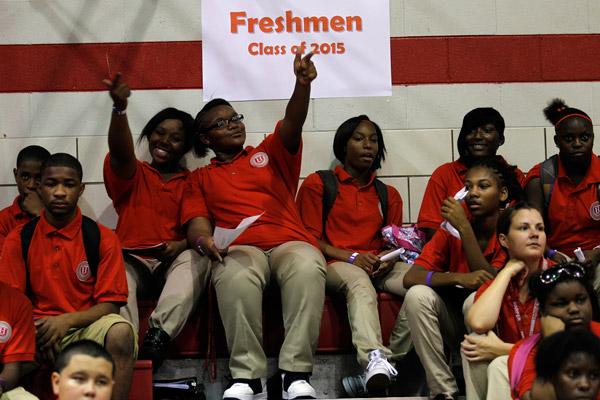
José M. Osorio/Chicago Tribune
Freshmen at Harper High School, August 8, 2011
I finally finished listening to This American Life's excellent two-part series on Harper High in Chicago. It's gotten deserved praise for its depiction of poverty and violence in a city high school. But it closes not with gangs, or shootings, but with funding: Ben Calhoun's account of how Harper is exiting its turnaround period and with it the flood of money that comes in, 18 percent of its budget this year.
This is exactly what Principal Sanders is worried about next year when the turnaround money goes away, the people she'll have to give up. Marcel's position is funded through next year. But he's exactly the kind of person who there won't be money for. Assistant Principal Chad Adams, the school psychologist, numerous teaching positions—not currently funded for next year. The social workers who you've heard working with Thomas and Devonte—there's Crystal, and there's Anita—next year, Anita will go away. And Crystal will only be part time.
According to Calhoun's reporting, the money worked:
The operations manager told me he's been a Chicago Public Schools money guy for 15 years. He's been at more than 10 other high schools. He told me he's seen programs like the turnaround program before. It was called other things– intervention, reconstitution but he says bluntly that Harper is the first time he's seen it work, partly because there's just been more money this time.
Coincidentally, Harper High School was "reconstituted" exactly 15 years ago, a decade before it became a turnaround school in 2008, with no shortage of money given to consultants. The new turnaround approach (Harper's plan is here) "takes a full two years to implement all of the various supports and programs. A 100% level of additional supports is maintained in years one and two. The next three years are spent perfecting the program and enhancing local capacity as supports are slowly withdrawn over the next three years. By the sixth year, the school will be fully restored as a high performing school operating within standard supports."
Basically the school is given training wheels; then they're pulled off, with the hopes that it'll roll on with the same two wheels it had before.
This reminded me of another result from the Joyce Foundation's survey that the Tribune commissioned. Asked what the "most important issue facing public education in Chicago" was, those surveyed responded in a perfect synthesis of the TAL episode's main themes.
Harper High School was one of the schools that participated in the Becoming a Man program, participants in which "experienced a 44 percent drop in arrests for violent crime and an up to 23 percent increase in graduation rates," according to a University of Chicago study. It's not cheap: $1,100 per participant, when the CPS operating expense per pupil is about $13k. But Jens Ludwig, whose Crime Lab conducted the study, argued that it paid off: "its impacts on criminal behavior generated benefits to society that are valued on the order of $3,600 to $34,000 per participant, depending on how we measure the costs of crime."



